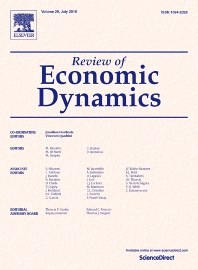
Douenne, T. (2020). Disaster risks, disaster strikes, and economic growth: The role of preferences Review of Economic Dynamics, 38:251--272.
-
Affiliated author
-
Publication year2020
-
JournalReview of Economic Dynamics
This paper studies the role of preferences on the link between disasters, growth, and welfare. An endogenous growth model with endogenous disasters is presented in which one can derive closed-form solutions with recursive preferences. The model distinguishes disaster risks and disaster strikes and highlights the numerous mechanisms through which they may affect growth. It is shown that separating aversion to risk from the elasticity of inter-temporal substitution bears critical implications that enable to better understand these mechanisms. In a calibration of the model based on empirical evidence about disaster impacts in the U.S., it is shown that precautionary savings are unlikely to be sufficient to generate a positive link between disasters and growth as sometimes encountered in the empirical literature. The paper also assesses the impact of disasters on welfare and highlights the large benefits that could be obtained by enhancing insurance coverage.